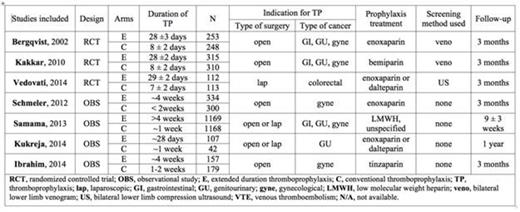Abstract
Introduction
Abdominal or pelvic surgery for cancer increases the risk of postoperative venous thromboembolism (VTE) by 2- to 3-fold. The use of low-molecular weight heparin (LMWH) to prevent post-operative thrombotic events is recommended in high VTE-risk patients; however, the role of extended thromboprophylaxis in this setting is controversial. We performed a systematic review and meta-analysis of randomized controlled trials (RCTs) and prospective observational studies to determine the effect of extended LMWH thromboprophylaxis on all VTE, deep vein thrombosis (DVT), pulmonary embolism (PE), major bleeding, and all-cause mortality after abdominal or pelvic surgery for cancer.
Methods
We searched MEDLINE, EMBASE, and Cochrane Central Register of Controlled Trials, conference abstracts, and trial registries with no language restriction. Studies were included if they compared extended duration (i.e., administration of prophylactic doses of LMWH for more than 2 weeks, up to 6 weeks) versus conventional duration of thromboprophylaxis (i.e., administration of LMWH for two weeks or less) after cancer surgery. Two reviewers independently performed study selection, data extraction, and quality assessment. Studies were evaluated according to a priori inclusion criteria and critically appraised using the Newcastle-Ottawa Quality Assessment Scale (NOQA). Pooled relative risk was estimated using a random effects model.
Results
Three RCTs and 4 observational studies were included, comprising 4807 adult patients who underwent open or laparoscopic abdominal or pelvic surgery for gastrointestinal, gynecological or urological cancers. The 3 RCTs employed screening for asymptomatic DVT using bilateral lower limb compression ultrasound or venography after 4 weeks of surgery. Most of studies were of good quality (NOQA higher or equal to 6). The extended thromboprophylaxis regimen was associated with a significantly reduced incidence of all VTE (2.6% [59/2292] vs 5.6% [124/2209]; RR=0.44 [95% CI 0.28-0.70]) and proximal DVT (1.4% [14/966] vs 2.8% [24/862]; RR=0.33 [95% CI 0.15-0.73]). No data were available for symptomatic DVT. There was no statistically significant difference in the incidence of symptomatic PE between the two groups (0.8% [8/966] vs 1.3% [11/862]; RR= 0.56 [95% CI 0.23-1.40]). We found no significant difference in major bleeding at 1.8% (14/787) in the extended thromboprophylaxis group vs 1.0% (7/713) in the short thromboprophylaxis group (RR=1.19 [95% CI 0.47-2.97]). There was no significant difference in all-cause mortality at 3 months (4.2% [30/720] vs 3.6% [23/643], respectively; RR= 0.79 [95% CI 0.47-1.33]). There was minor heterogeneity between the studies in all extracted outcomes.
Conclusion
Extended thromboprophylaxis with LMWH after abdominal or pelvic surgery for cancer significantly decreased the incidence of all VTE and proximal DVT, but had no impact on symptomatic PE, major bleeding or 3-month mortality.
Lee:Pfizer: Consultancy, Honoraria; LEO Pharma: Consultancy, Honoraria; BMS: Research Funding; Bayer: Consultancy. Wu:Leo Pharma: Consultancy, Honoraria, Membership on an entity's Board of Directors or advisory committees; Pfizer: Consultancy, Honoraria, Membership on an entity's Board of Directors or advisory committees.
Author notes
Asterisk with author names denotes non-ASH members.


This feature is available to Subscribers Only
Sign In or Create an Account Close Modal